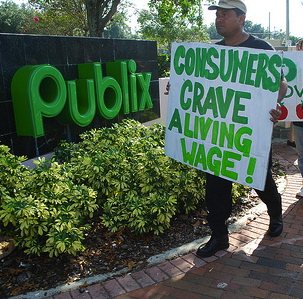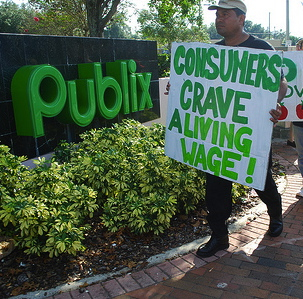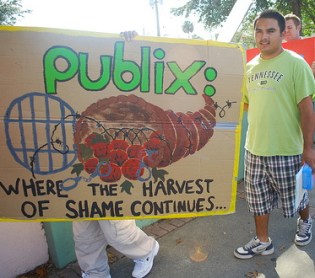
Photo by Juan Barredo.
On March 5, dozens of Florida farmworkers will stop eating. In a week-long Fast for Fair Food, they will sit on the grassy swards of Publix Supermarket headquarters in Lakeland, Fla., their weary bodies on display to the upper management of Florida’s largest private corporation. Those managers and chiefs have refused to sign something called the Fair Food Agreement with the Coalition of Immokalee Workers (CIW), an agreement which would stop the company from purchasing tomatoes from suppliers who abuse workers, and pass on an extra penny per pound of tomatoes directly to the workers. After over two years of emails, petitions, letters, massive marches, and demonstrations, the farmworkers will turn to this most basic of arguments: we are real people, with vulnerable bodies that do not deserve the abuse they receive. And we are fiercely committed.
In a recent post, Barry Estabrook has clearly set out what is at stake for the farmworkers in this fast. He writes:
A strength of the Fair Food Agreement is that it links all levels of players in the tomato business in a unique partnership to improve working conditions: the men and women who pick and pack the fruits, the agricultural companies that operate the farms and packing facilities, and — critically — the end buyers of the tomatoes. Restaurant chains (including such giants as McDonald’s and Burger King) and food service providers support the agreement, which calls on them to pay an extra penny per pound directly to the workers, a raise of nearly 50 percent. But with the exception of Whole Foods Market and now Trader Joe’s, not a single grocery chain has agreed to participate.
Meanwhile, a parallel story is taking place. Because the fierce commitment doesn’t end with the farmworkers. Hundreds of others, who have perhaps never seen a tomato field, will be supporting and fasting with them, there and in solidarity actions around the country. A lot of them will be students and young people, like myself, organizing through the Student/Farmworker Alliance.
The work of the Coalition of Immokalee Workers moves us, and leaves us surprised. My generation was trained to think solidarity like this can’t happen. We were raised to be cynics. Unlike those born in earlier generations, we have pretty much always known that the dominant message about our food — beaming at us from cereal boxes and billboards — is a lie. We’re aware that advertising is a Wizard of Oz light show, only what’s behind the curtain isn’t a funny old man, it’s a sweatshop.
The trick works because it meets our yearning for a sort of family. Advertisements teach us that ready-made rice brings three generations together for Sunday dinner, organic yogurt brings you back to the farm, and food corporations use friendly first names and build for us a family. We get kid sisters Wendy and Little Debbie, Papa John and Jimmy John, and moms like Betty Crocker and Sarah Lee.
In a similar vein, Publix market offers up this Thanksgiving-themed ad featuring a down-to-earth grandma who makes her signature stuffing and teaches us about family. She joins the polite bustle of a multi-generational feast and leaves us with this message: Maybe cooking and family are difficult and time-consuming, but “when the right ingredients come together, it’s magic.”
Publix knows food is never just about caloric intake: Food is always ritual, it always carries the weight of family. We hunger not for the “right ingredients,” but for magic — a spark of connection.
But if the CIW can marshal hundreds of supporters around the country for their Fast for Fair Food, it is perhaps because they’re also offering consumers that connection. Their popularity suggests that in the face of corporate seduction, we maintain our authenticity not through disengagement, but engagement. Contact, not dropping out. Because the ones who bring us food are family, in a way.
If Publix wants us to be emotionally engaged with their produce aisle, then by all means let’s engage. But let’s find a better way, that doesn’t give us this emotional-manipulation-for-profit hangover. We could start with tomatoes.
Tomatoes aren’t “magic”: They come from somewhere. Before they form the “right ingredients” for a television grandma’s recipe, those tomatoes are grown and harvested by people.
Let’s reimagine the commercial, except with a clear depiction of a tomato’s story before its debut on the Publix shelf. We’d see it hand-harvested while green and hard. A workers who needs to pick 2.5 tons of tomatoes in a day in order to make minimum wage. We’d see the lack of work security, lack of shade, the sexual harassment, the routine pesticide exposure. And, at the extreme, slavery.
With very little work, this could be a commercial worth shedding a tear over.
If the commercial went on to tell the whole story, we’d see those workers, under impossible conditions, speaking different languages, organizing, and forming the CIW on this basic premise: Golpear a uno es golpear a todos (they beat on one of us, they beat on us all).
We’d see them taking on food giants like Taco Bell, working with students across the country, marching, and going on hunger strikes ending in hospitalizations. We’d also eventually see them winning agreements with McDonald’s, Burger King, Subway, grocery stores like Whole Foods, and — just recently — Trader Joe’s. We’d see a radical change beginning in the fields, rights trainings on company time, time clocks and minimum wages, workers who are empowered to report abuse for the first time.
The right ingredients, coming together. This is magic.
But then, after all of this, this imaginary commercial would have to show Publix supermarkets, the largest private corporation in Florida, denying these Florida farmworkers a penny-per-pound pay increase, and defending their ability to continue supplying tomatoes from known labor rights abusers. We’d see the Publix spokesperson, when asked about abuse of farmworkers, saying: “If there are some atrocities going on, it’s not our business.”
Perhaps the commercial’s syrupy voice-over could even croon, “Publix: where shopping is oppression.”
And maybe then we would find some small way to join those farmworkers — whether outside the gates of Publix or in spirit. Maybe we’d also recognize that this relationship – with the actual people who produce our food — is the nourishment we most need. Not a box of stuffing from Publix.





